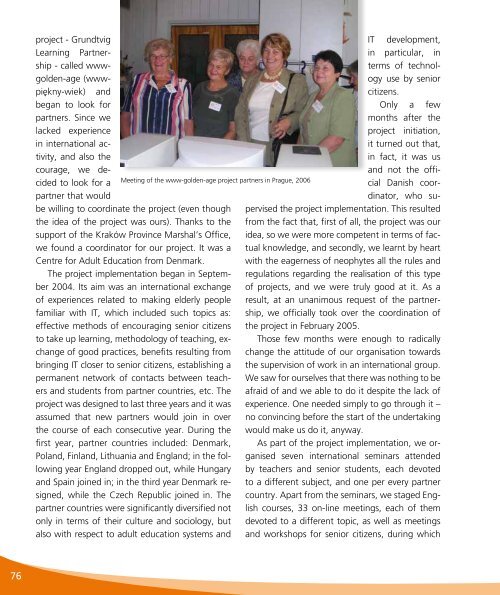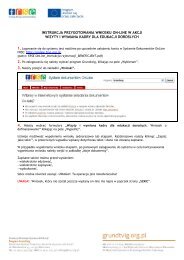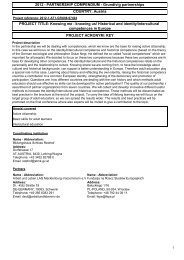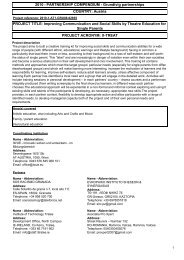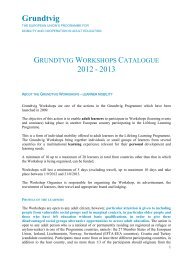Pobierz plik - Grundtvig
Pobierz plik - Grundtvig
Pobierz plik - Grundtvig
You also want an ePaper? Increase the reach of your titles
YUMPU automatically turns print PDFs into web optimized ePapers that Google loves.
project - <strong>Grundtvig</strong><br />
IT development,<br />
Learning Partnership<br />
in particular, in<br />
- called www-<br />
golden-age (wwwpiękny-wiek)<br />
terms of technology<br />
use by senior<br />
and<br />
citizens.<br />
began to look for<br />
Only a few<br />
partners. Since we<br />
lacked experience<br />
in international activity,<br />
and also the<br />
courage, we decided<br />
to look for a<br />
partner that would<br />
Meeting of the www-golden-age project partners in Prague, 2006<br />
months after the<br />
project initiation,<br />
it turned out that,<br />
in fact, it was us<br />
and not the official<br />
Danish coordinator,<br />
who supervised<br />
be willing to coordinate the project (even though<br />
the idea of the project was ours). Thanks to the<br />
support of the Kraków Province Marshal’s Office,<br />
we found a coordinator for our project. It was a<br />
Centre for Adult Education from Denmark.<br />
The project implementation began in September<br />
2004. Its aim was an international exchange<br />
of experiences related to making elderly people<br />
familiar with IT, which included such topics as:<br />
effective methods of encouraging senior citizens<br />
to take up learning, methodology of teaching, exchange<br />
of good practices, benefits resulting from<br />
bringing IT closer to senior citizens, establishing a<br />
permanent network of contacts between teachers<br />
and students from partner countries, etc. The<br />
project was designed to last three years and it was<br />
assumed that new partners would join in over<br />
the course of each consecutive year. During the<br />
first year, partner countries included: Denmark,<br />
Poland, Finland, Lithuania and England; in the following<br />
year England dropped out, while Hungary<br />
and Spain joined in; in the third year Denmark resigned,<br />
while the Czech Republic joined in. The<br />
partner countries were significantly diversified not<br />
only in terms of their culture and sociology, but<br />
also with respect to adult education systems and<br />
the project implementation. This resulted<br />
from the fact that, first of all, the project was our<br />
idea, so we were more competent in terms of factual<br />
knowledge, and secondly, we learnt by heart<br />
with the eagerness of neophytes all the rules and<br />
regulations regarding the realisation of this type<br />
of projects, and we were truly good at it. As a<br />
result, at an unanimous request of the partnership,<br />
we officially took over the coordination of<br />
the project in February 2005.<br />
Those few months were enough to radically<br />
change the attitude of our organisation towards<br />
the supervision of work in an international group.<br />
We saw for ourselves that there was nothing to be<br />
afraid of and we able to do it despite the lack of<br />
experience. One needed simply to go through it –<br />
no convincing before the start of the undertaking<br />
would make us do it, anyway.<br />
As part of the project implementation, we organised<br />
seven international seminars attended<br />
by teachers and senior students, each devoted<br />
to a different subject, and one per every partner<br />
country. Apart from the seminars, we staged English<br />
courses, 33 on-line meetings, each of them<br />
devoted to a different topic, as well as meetings<br />
and workshops for senior citizens, during which<br />
76


